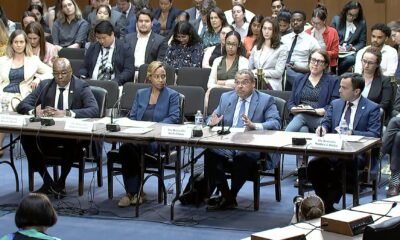Politics
Right-to-Life Advocates Narrow Focus in Legal Battle Against Abortion Law

Opponents of the constitutional right to abortion are scaling back parts of their court challenge aimed at keeping the issue off the November ballot. On Tuesday, Arizona Right to Life refiled its lawsuit against Proposition 139, maintaining that the proposed constitutional amendment is “misleading.”
However, the revised version of the lawsuit now omits several claims about legal improprieties in gathering the over 820,000 signatures submitted by Arizona for Abortion Access. Allegations that circulators failed to comply with state law and used fraudulent means to trick individuals into signing the petition have also been removed.
This leaves the judge to focus on the primary argument that the entire petition drive is “faulty.” With claims about insufficient valid signatures removed, Arizona Right to Life now bears the burden of proving that the 200-word summary on petition sheets is so misleading that it would “create a significant danger of confusion or unfairness.” They need to demonstrate that Arizonans might not understand the issue they are being asked to approve.
A hearing on the matter is set for Friday before Maricopa County Superior Court Judge Melissa Julian, a former appointee of Gov. Doug Ducey. Regardless of her ruling, an appeal to the Arizona Supreme Court is almost certain.
Proposition 139 seeks to establish a constitutional right for women to terminate a pregnancy. Abortions would be largely unrestricted before fetal viability, considered between 22 to 24 weeks. Post-viability abortions would be allowed to protect the life or physical or mental health of the mother. Arizona Right to Life argues the measure has been misleadingly presented as protecting abortion only up to viability, while it would actually permit abortion up to birth.
The group contends that the exception for “mental health” is so broadly defined that virtually no restrictions would apply. They argue that voters might sign the petition not realizing the extent of protections for late-term abortions. Additionally, they claim the measure’s language permits abortions only if there is a “compelling state interest,” which they say erases all other governmental interests except making abortion safer for women.
A major concern for opponents is the initiative’s language ensuring regulations do not infringe on a woman’s “autonomous decision making,” which they argue would allow unlicensed providers to perform abortions and override parental consent laws—points not clearly depicted in the 200-word petition summary.
Jill Norgaard, spokeswoman for Arizona Right to Life, stated that dropping the claims about petition signers and circulators helps focus on the core issue of allegedly “vague and misleading” language in the petition.
Dawn Penich, spokeswoman for Arizona for Abortion Access, welcomed the decision to drop what she called baseless claims about petition circulators. Penich noted that their group plans to recover legal fees spent preparing to counter the now-dismissed allegations. She described the remaining arguments from Arizona Right to Life as “flimsy” and stressed that their opposition will go to great lengths to deny Arizonans their rights.


















